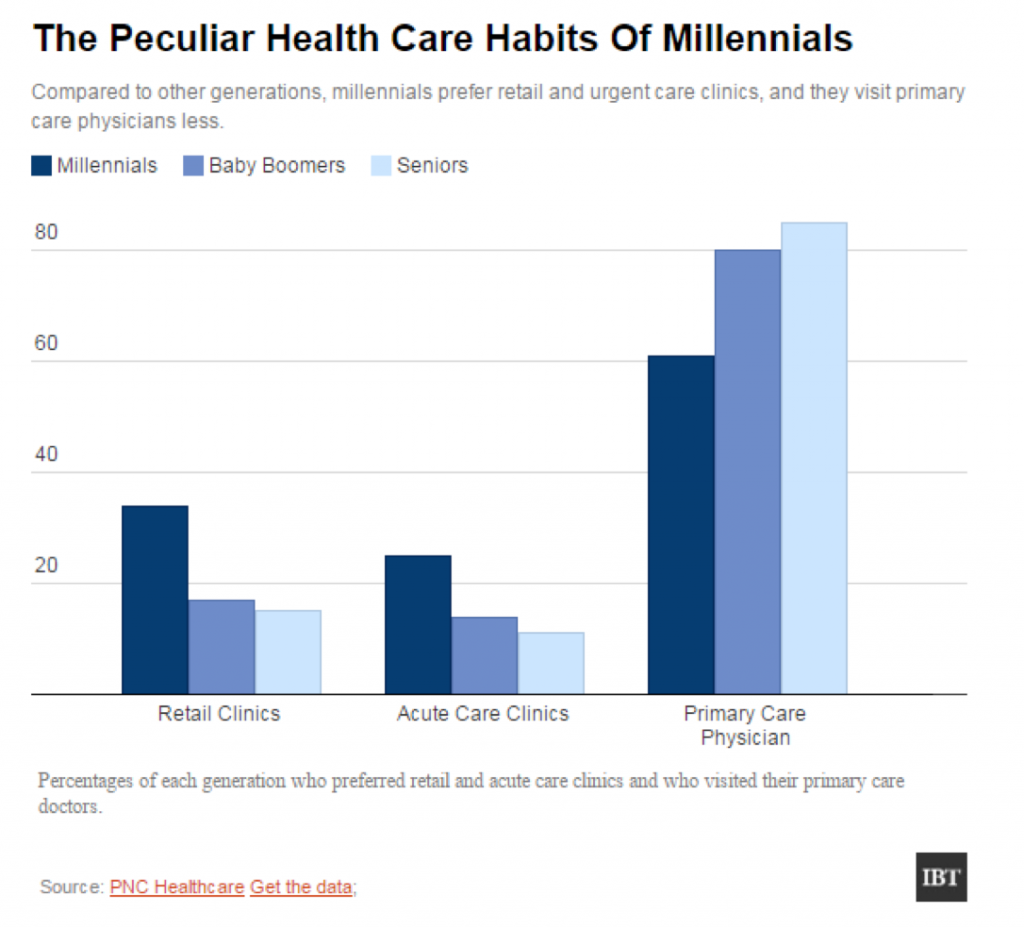
The doctor will see you now
Understanding behaviour across and within generations plays an important role with investing. We’ve discussed this recently with media usage, and today we’ll discuss how millennials are utilising health care.
Unsurprisingly, millennials are far more discerning with their health care choices, due to greater use of online resources and financial constraints such as university debt. What’s interesting though is that the younger generation does not seem to be acting uniformly with these decisions.
You see, the traditional health care system is centred on the doctor. Physicians are typically the first point of contact for health care delivery, and older generations will likely have a strong relationship with a single physician. This is why hospitals, medical device manufacturers and government bodies focus so intently on this channel.
Yet rather than using the front door, millennials are choosing their own way to enter the health care system (if they choose to at all). As shown by the graph below, millennials are more likely than other age groups to use retail clinics and urgent care centres for nonemergency care.
This could make coordination between health care parties even more difficult, and means that an effective health care system may not be linear. Sure, changes can be attempted now at the traditional entry point to address the rapidly ageing population, but the organisations that determine how to capture and coordinate this discerning age group will accrue significant benefits. Ben MacNevin is an Analyst with Montgomery Investment Management. To invest with Montgomery domestically and globally, find out more.
Ben MacNevin is an Analyst with Montgomery Investment Management. To invest with Montgomery domestically and globally, find out more.
This post was contributed by a representative of Montgomery Investment Management Pty Limited (AFSL No. 354564). The principal purpose of this post is to provide factual information and not provide financial product advice. Additionally, the information provided is not intended to provide any recommendation or opinion about any financial product. Any commentary and statements of opinion however may contain general advice only that is prepared without taking into account your personal objectives, financial circumstances or needs. Because of this, before acting on any of the information provided, you should always consider its appropriateness in light of your personal objectives, financial circumstances and needs and should consider seeking independent advice from a financial advisor if necessary before making any decisions. This post specifically excludes personal advice.
INVEST WITH MONTGOMERY
Gregory Salway
:
Hi Ben,
Plenty of “50 somethings” I know are going to a different doctor each time they are absent from work. The fear in their mind being if their employer finds out they have a chronic health issue – which may or may not be caused by their employment, then they are more readily disposed of…
Lissica
:
That depends whether continuity of care is valued by society. If you turn up to see a doctor you’ve never met before, with complex medical issues, don’t expect it sorted in 15 min.
Sam
:
Interesting article Ben.
It’s sure to be a changing scene. I’d personally love to see more rights given to individuals i.e. being able to see a specialist without the need for a GPs referral and also GPs being liable / not permitted for / to refuse a patients request for blood work or treatment that is not on the GPs “approved list” (is it to much to say this approved list is pharmaceutically driven…)
Ken Robson
:
I’m pedantic but the term millennials should be defined, and what is meant by the three medical treatment groups clarified.
It would seem to me that more and more people are using the internet as a source of independent information, and to source treatment options that suit them, but does this mean a shift away from conventional medical treatment options? has simply become an advertising tool for the real estate industry.
Carlos
:
Ben you forget that the medical staff in “retail clinics” and “urgent care centres” are GP’s. it’s just a different format.
Anthony
:
Hi Ben, very interesting article – thank you. Can you please give me examples of what a retail clinic & a acute care clinic is or provide a definition of both. Thanks
Ben MacNevin
:
Hi Anthony, a retail clinic is where medical care is provided in retailers and pharmacies. They’re quite prevalent in the US, such as CVS and Walgreens. Urgent care centres are dedicated to providing care for critical injuries and illnesses but operate outside of hospitals. The key concept we must be considering for Australia is whether the local GP will remain a critical component of health care delivery.
Jim Hasn
:
Hi Ben, They will but only because there are more boomers than millenials. Family care physicians are the ones most at risk from the information age